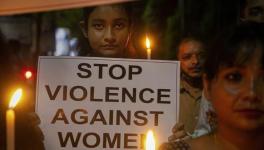Time to Criminalise Marital Rape

Representational image. | Image Courtesy: Wikimedia Commons
In the recent hearings in the matter of RIT Foundation v. UOI pending before the Delhi High Court, several arguments have been made in favour of both removal and retention of the marital exemption from the definition of rape. An analysis of the provision as well as their context exposes the curious tussle between deontological and consequentialist reasonings at the heart of the arguments. It also begs the question – should the impetus for reform come from the judiciary or should the task be left to the legislature instead?
The marital exemption to rape violates the right to equality in as much as it discriminates between married and unmarried women. It also assumes that a woman consents to all sexual activities at the time of marriage, and therefore impinges on her sexual autonomy and individual liberty. The exemption is based on Victorian concept of morality according to which a woman is the property of her father and her husband. Most countries and former colonies which borrowed such morality have already shed the same. In our context, the reading of both Articles 14 and 21 of the Constitution, as given by the Supreme Court in its Navtej Johar and Joseph Shine judgments leaves little doubt that the exemption is antiquated and must be brought in tune with constitutional morality.
Potential for misuse?
The opposition to the removal of the exemption is based on familiar consequentialist grounds. As is with the case of Section 498A of the Indian Penal Code [IPC] and the Protection of Women from Domestic Violence Act [PWDV Act], it is being argued that the removal of the exemption amounts to excessive interference with the institution of marriage. The argument goes further that men would be crucified by their wives trying to monetise penal laws in their favour. However, a potential for misuse of the law cannot be an argument against its enactment. The misuse of the law is not only a problem for the accused, but also for victims. We must, therefore, plug the loopholes which have the potential for exploitation. The exercise requires a re-examination of procedural and evidentiary safeguards in rape trials. This requires a larger exercise than a simple reading down of the marital rape exemption – a task best suited to the Legislature.
The exemption is based on Victorian concept of morality according to which a woman is the property of her father and her husband. Most countries and former colonies which borrowed such morality have already shed the same.
In his book titled ‘The Limits of the Criminal Sanction’, American criminologist Herbert Packer unequivocally states that the power to criminalise a conduct lies first with the Legislature, then with the Courts and with no one else. Therefore, it must also be considered if the task of removing the marital rape exemption should be left to the legislature rather than the judiciary.
Other remedies?
Another argument which is proffered in support of its retention is that of ‘other remedies.’ It is argued that a victim of spousal rape has the option to file for divorce. Civil remedies including divorce or PWDV Act, however, are hardly a substitute for criminal offences. Similarly, it is argued that remedies are available to the victim under Sections 498A (cruelty by husband or relatives) and 377 (unnatural carnal intercourse) of IPC. However, the existence of alternate remedies barely validates the exemption from prosecution for rape. The idea that other laws provide ‘enough remedy’ against rape just trivializes the real violation that is inherent in rape. Rape laws aim to protect not just physical safety but also preserve the sexual autonomy of women; they exist to also acknowledge the unique nature of this offence and its ubiquity.
A potential for misuse of the law cannot be an argument against its enactment. The misuse of the law is not only a problem for the accused, but also for victims. We must, therefore, plug the loopholes which have the potential for exploitation. The exercise requires a re-examination of procedural and evidentiary safeguards in rape trials.
Rape trials, in and of themselves, are problematic. That it is notoriously hard for the prosecutrix to prove the factum of rape is well documented, especially in cases where the only evidence that can be relied upon is the testimony of the prosecutrix. Even as the sole testimony of the prosecutrix is enough to secure a conviction, courts generally have a tendency to acquit unless such evidence is found to be of ‘sterling quality’ – an extremely tough standard. Shifting the burden of proof by adding a presumption of absence of consent in cases of aggravated forms of rape has not helped the victims much either. The conviction rate in rape cases as per 2019 data from the National Crime Records Bureau, stood at a meagre 27.8 per cent. Instead, shifting the burden of proof has diluted established principles of criminal laws to a great extent, and has been subjected to much criticism on this ground.
Rape laws aim to protect not just physical safety but also preserve the sexual autonomy of women; they exist to also acknowledge the unique nature of this offence and its ubiquity.
These problems are likely to multiply where the accused is the husband of the prosecutrix. The removal of marital exemption might throw up greater evidentiary problems surrounding consent. To exemplify, evidentiary provisions in rape trials create a bar as regards evidence of previous sexual activity. However, it may very well be pertinent for the accused to refer to previous sexual activity to establish the presence of consent. These issues are absent in other jurisdictions in as much as the Courts are empowered to dilute the bar on evidence of previous sexual activity if the same is found to be in the interests of justice, though the same must be balanced against the dignity of the victim.
Should rape be a gender-neutral offence?
Some also argue that if marital exemption is to go, then the offence of rape must be made gender-neutral. However, given the hierarchical nature of a heterosexual marriage, specifically, this argument is rather ludicrous. We cannot ignore the crucial differences between a woman’s social positioning and what marriage means and entails for men and women, respectively. This provides a false neutrality to an institution that almost unvaryingly adversely affects the security and wellbeing of women in patriarchy. Feminist scholars argue that in India, where violence against women in the form of honour killings, dowry-related violence, and mental and physical abuse within domestic settings remains pervasive, a gender-neutral marital rape provision would further marginalise them.
The existence of this exemption encourages the subordination of women within their private lives. It also means that the State has legitimised men’s illegitimate control over women, to the extent that it can even allow routinized sexual assault on them in order to secure this control.
The argument that the institution of marriage would crumble if the exemption was removed is rather odd. The existence of this exemption encourages the subordination of women within their private lives. It also means that the State has legitimised men’s illegitimate control over women, to the extent that it can even allow routinized sexual assault on them in order to secure this control. As American feminist legal scholar Robin West would argue, by legitimising this physical violence against married women by their partners, the State creates a separate political world, where the man is the sovereign and the woman is a subject. The institution of marriage, thus, becomes not a democratic home, or a nurturing environment filled with love and harmony, but a site for organized and legal sexual violence against one of them. However, the State has an international legal obligation to not be complicit in furthering gender-based violence, and accord security to all its citizens equally.
(G. S. Bajpai is the Vice-Chancellor of Rajiv Gandhi National University of Law, Punjab, where Ankit Kaushik is an Assistant Professor. Mehak Bajpai is a Research Scholar at National Law University, Delhi. The views expressed are personal.)
Get the latest reports & analysis with people's perspective on Protests, movements & deep analytical videos, discussions of the current affairs in your Telegram app. Subscribe to NewsClick's Telegram channel & get Real-Time updates on stories, as they get published on our website.
























